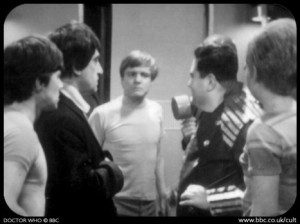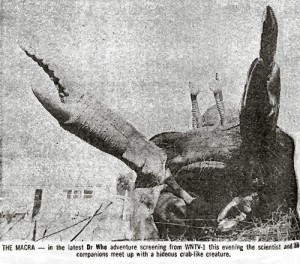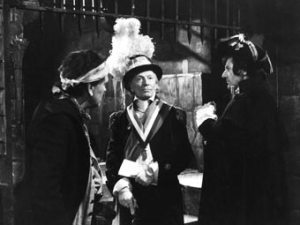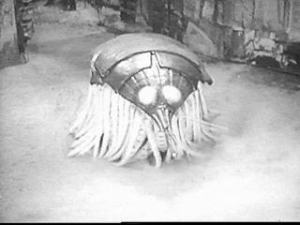
Maybe landing at an airport was a bad idea.
So, the travelers land in 1966 London Gatwick airport right smack on the runway. If I’m not mistaken, they’ve landed on a runway briefly before, in one of the Dalek chasing episodes. But this time they stay, only to have Jamie flee in terror away from a “flying beasty.” While mildly amusing at first, I’m glad he only mentions the beasties one more time because it could become annoying pretty quickly. At any rate, there are very few interactions with the airplanes. But here’s my question. Why didn’t they look at the monitor? “Oh, we’re on an airport runway, there are planes everywhere. This looks like a great place to go out and explore!” Not the best decision they’ve ever made. But, I suppose they have made much dumber exploration choices so I can’t complain too much about that.
What I can complain about, though, is how painfully long and boring this story was. I thought the 6-episode story had gone the way of Dodo (see what I did there?), but apparently I was wrong. The premise of the story was great (Invasion of the Body Snatchers pod people in a location as inhuman and cold as an airport? nice work. though, admittedly, not entirely original.) and there are some definite bright points (the first appearance of the faceless ones, for example, is genuinely creepy). However, the search for what was going on in the Chameleon Tours hangar lasted just a tad too long. Like about 2 episodes too long. I found myself checking Twitter and playing Angry Birds during episodes 5 and 6. When episode 4 started, I couldn’t believe there were 3 more episodes. The truth of the matter is I started this story way back in January when I was on a mini Doctor Who roll, but I kept falling asleep and eventually gave up (my doctoral exams scheduled in March and April didn’t help). Now I know why I couldn’t make it through.

Ready for a new face!
So, the gist of the story, Polly (whose hair is now inexplicably long again. Shame.) witnesses a murder in the Chameleon Tours hangar, then goes to tell the Doctor. The Doctor and Jamie investigate, Polly is kidnapped, Ben is MIA. Meanwhile, the dude in charge of the airport, Commandant, is concerned about the TARDIS clogging up his runway and suspects Doctor and Jamie, who are standing at the immigration desk without passports. The people at Chameleon Tours are stealing the identity of airport personnel as well as some youths to replace their faces after some horrible accident on their home planet. They do this by complicated medical procedures that transfer physical characteristics but leave the original in tact. And, luckily for their victims, the originals have to be kept alive and they have to wear arm bands. If the arm bands are removed, the Chameleons simply disappear. That’s right, they disappear. Not turn back into chameleons. Not go through some painful transformation. Not fall over dead. Disappear. I don’t get it. Also, they hide the originals somewhere that they are sure no one will ever find them….in parked cars. In a parking lot. At the airport. Genius. Because no one will EVER look in cars that have been parked there for years. And the bodies will NEVER overheat, freeze, or starve. And they were bragging about their superior intelligence…
Somehow, they have kidnapped 50,000 teenagers and only one — ONE! — has been reported missing. That missing kid’s sister, Samantha, is at the airport and helps the gang unravel the mystery. Very. Slowly. In order to transport all of the originals back to Chameleonus or whatever planet they come from, they miniaturize the people and put them in drawers, a la The Ark. The Doctor solves the mystery and everyone is saved. Even the Chameleons are granted clemency and allowed to return to their home planet and find some other way to get faces. The Doctor even offers to help.
While the story was too long, it showcased Jamie’s and the Doctor’s strength. I like Jamie. As soon as his innocence completely fades (“Look out! A flying beasty!”), I think he will be quite enjoyable. Also, Troughton’s Doctor has fully grown on me. I’ve gotten into his mischievous, witty groove. And in an odd way, I kind of buy him as a younger, refreshed version of Hartnell’s doctor. It took a little bit to get there, but I could see this man becoming Hartnell in old age when he’s just as clever but not really able to move quite as quickly and starts to get grumpy. Patrick Troughton would definitely wear that sweet hat Hartnell wore during the French Revolution.
Polly and Ben didn’t really have much to do in this story. Ben spent a lot of time missing and Polly was chameleonized. This is probably for the best since it was their final story and Jamie needed the opportunity to shine. Also, the Wikipedia tells me that Samantha was asked to remain on as a companion, but she refused. As the story was going on and I realized this would be Polly and Ben’s last (They were in London in 1966. It was kind of obvious), I thought she was going to be sticking around. I even kind of hoped. She complemented Jamie well and was clearly written to be a companion. But, no such luck. Anyway, Polly and Ben left, it wasn’t very surprising. I liked Ben a lot, he was very no-nonsense. Polly I liked a little less. But, she was hot. The first hottie companion, which, if I’m not mistaken, is the path the show would take with most of the rest of their female companions. Probably a good choice.
It turns out, it was the exact same day (July 20, 1966) that they had previously departed with the Doctor so it would be as if they were never even gone. Now, this brings up some potential time travel paradox stuff. While the Doctor is running around Gatwick Airport, somewhere in another part of the city he is defeating WOLTAN. There are also two Polly and Bens. What if Polly and Ben go back downtown before they leave? They could see themselves and rip a hole in time-space continuum. Or, what if Troughton were to somehow meet Hartnell? All hell would break loose at that point, I’m sure. And, it seems like WOLTAN taking over the world’s computer systems would be news and Commandant would be concerned about all this Chameleon Tours nonsense happening at the same time as a major computer changeover. And, if this is an alternate Earth rather than the same Earth, there would be two Polly and Bens forever. Convenient plot device, terrible consequences.

Goodbye, Ben and Polly. Don't look so sad.
























